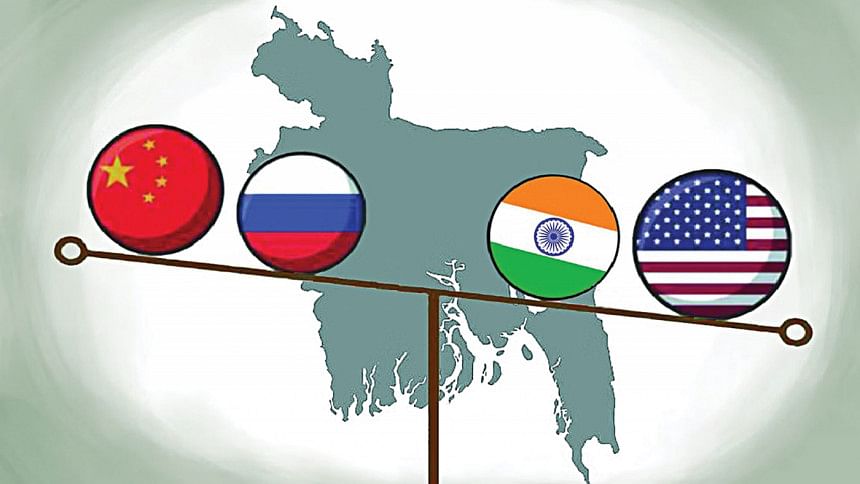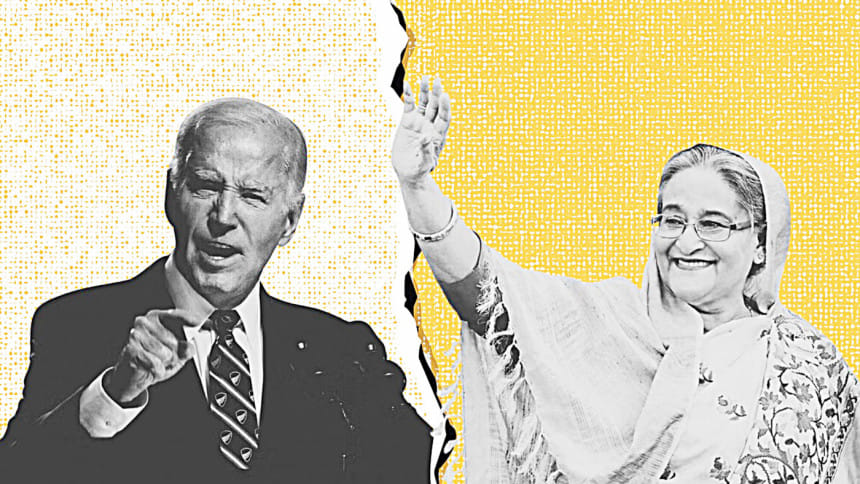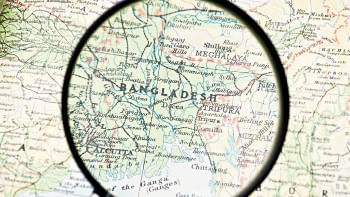Walking a tightrope or walking the plank?

Bangladesh has kicked off the year with the first of many important national elections to be held around the world. However, all the violence and controversy surrounding the election leaves quite a sour taste and indicates an alarming precedent for further democratic backsliding worldwide. The past year in particular saw an unprecedented level of international attention towards Bangladesh. Almost all major superpowers had many things to say about the way Bangladesh conducted the polls. The most vocal of them were its major Western development partners—the US, UK, EU, Australia, Canada and also the UN. Needless to say, their impression of the way the election was conducted is far from affable. Almost every single major human rights watchdog has criticised the government for its crackdown and mass arrest of opposition activists and leaders right before the election, as well as its systematic disregard for human rights, right to assembly, and freedom of expression. On a geopolitical level, there is a very simple explanation for this rise in interest from the West. It is a direct result of the growing Chinese influence in Bangladesh and the response from the West in the form of the Indo-Pacific Strategy (IPS).
The key friction is between the US and China. In the wake of a global recession, economic competition and geostrategic rivalry between these two giants have had rippling effects on almost all nations stuck in between. Bangladesh, being one of the fastest growing economies, the eighth most populated country in the world with a young and resilient population, host to more than a million trapped Rohingya refugees, and labelled as a "moderate Muslim" nation, has become a vital battleground between these two powers. The geostrategic importance of Bangladesh is also of note, being the only non-aligned nation with ports in the Bay of Bengal and serving as a vital bridge between South Asia and Southeast Asia. China has, for a long time, seen Bangladesh as an important part of its maritime silk route global infrastructure project. Under this subsection of the Belt and Road Initiative (BRI), China has begun to conduct massive infrastructure development projects in Bangladesh, as it has done in many other countries in Asia and Africa. This rapid growth in China's international ties and global soft power has rung the alarm bells in Washington, which has a very complicated and "strategically ambiguous" relationship with China. On the one hand, there is an enormous amount of economic dependency between the two countries. On the other, there is a deep ideological divide. The fault line right now is, of course, the Taiwan Strait. Many international security experts predict that if there is ever a complete decoupling and subsequent military conflict between the US and China, it will be due to Taiwan.

The history of China, Taiwan, and the greater South China Sea is a topic all in itself. However, the fate of Bangladesh has now become linked to this theatre of competition. China has laid claim to all of the South China Sea on the basis of its history, subverting the United Nations Convention on the Law of the Sea (UNCLOS). Chinese naval ships and militarised civilian vessels patrol what is meant to be independent waters as if it is China's own backyard. The US counters these excursions by sending its own naval vessels across the independent waters in provocative exercises to ensure freedom of navigation in the region. In fact, the entire Quadrilateral Security Dialogue (QUAD) and AUKUS security architecture are almost entirely geared towards containing China's militarisation of the South China Sea. Of course, India is a vital player in QUAD and the lynchpin of the US's greater strategy for South Asia.
This is just one US approach to combating China's influence. The other main approach is through espousing the values of democracy. Through the introduction of Biden's summit for democracy, the US planned to create an ideological buffer against China, painting it as an undemocratic actor bent on entrapping feeble economies with alluring economic promises. This approach has been somewhat successful.
Unfortunately, when it comes to Bangladesh, these two strategies are in direct conflict. The security angle of the QUAD relies on a strong US-India strategic relationship. India, in turn, has a keen interest not to disturb the existing status quo in Bangladesh, no matter how undemocratic that status quo is. India is convinced that the alternative to the current regime is the rise of fundamentalist Islamic forces in Bangladesh, which in turn is seen as a security risk by India. There seems to be a quid pro quo in the US and India's security partnership where the level of pro-democracy advocacy the US can carry out in Bangladesh is limited by the need to ensure India's regional security. However, this attempt by the US to appease India is giving China far more room to manoeuvre, which is seen as a security risk by both India and the US. Whatever status quo India convinced the US to maintain is directly opposed to its global pro-democracy campaign.
Looking at the results of the 2024 election in Bangladesh, the one thing that becomes clear is that the current regime is not very popular. Even with allegations of vote rigging, the turnout figure could only be shown to be about 41 percent. Many assume that the actual figure is far below that number. The reasons for the unpopularity of the regime are quite clear: more than a decade of disregard for human rights and a systematic failure to improve the condition of democracy in Bangladesh. Instead of empowering the people, power has been entirely centralised to the point where there is virtually no separation between party, state, executive, and other state machineries. Laws such as the Cyber Security Act continue to give the state overwhelming power to arrest detractors and silence criticism. Upcoming laws such as the Data Protection Act are poised to allow the government unprecedented capability to collect and control citizens' personal data without oversight and, most likely, without consent.
There was a lot of hope among many people that there would be sufficient pressure at home and abroad to finally bring some semblance of democracy back into Bangladeshi politics. This hope was primarily fuelled by the US and its allies being very vocal about the need to implement changes that have been due for far too long. This kind of interest in the state of Bangladesh's democracy is very new for all of us.

The sanctions against RAB, new visa policy, and the active role of the US Department of State in terms of high-level visits to Bangladesh, raised a number of questions. But the recent slowdown in the US's push for democracy right before the election is now being attributed as another example of India's influence in regards to the situation in Bangladesh.
The rollback of the US initiative and India's failure to improve people-to-people relations with its neighbours have ultimately given China an open field to increase its investment. The new Teesta project by China seems tailor-made to take advantage of the anti-India sentiment in Bangladesh and solidify its position in the region. Even if the US wants to look at Bangladesh through the Indo-Pacific lens, it must be restated that the election and its result were not the best outcome for either India or the US. I believe the true winner here is definitely China.
The US has expressed its commitment to increasing engagement with the people of Bangladesh and its civil society. However, that engagement has to be very visible and significant in order to be effective. Washington and New Delhi must realise that their strategies risk failing in Bangladesh. Some argue that the only way forward is the pro-democracy approach, alongside the QUAD-based security approach. However, if these two strategies remain in conflict, nothing will stop China from fulfilling its BRI objective in Bangladesh. Perhaps the result of the election and the subsequent entanglement between China and Bangladesh will be a wake-up call for the US. However, it remains to be seen if the people of Bangladesh will benefit from all this international attention.


 For all latest news, follow The Daily Star's Google News channel.
For all latest news, follow The Daily Star's Google News channel. 




Comments